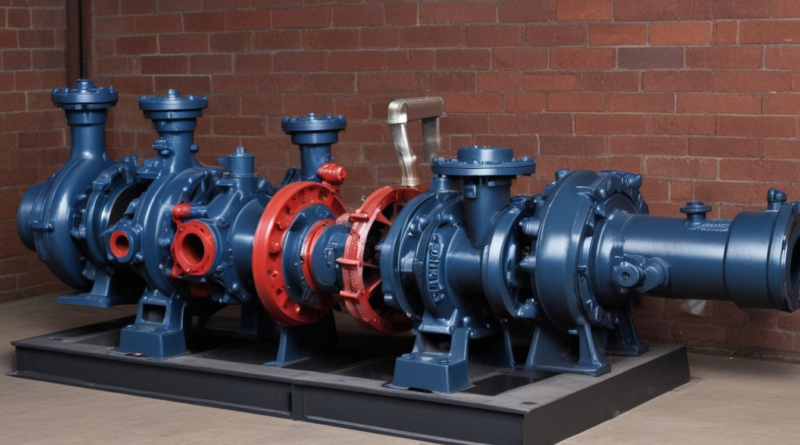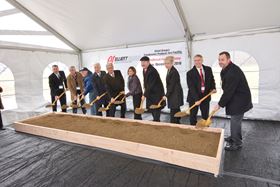the benefits of using cast iron pumps
Cast iron pumps are renowned for their exceptional durability and longevity, making them a preferred choice in various industrial and commercial applications. The inherent strength of cast iron ensures that these pumps can withstand harsh operating conditions, including high pressures and abrasive fluids, without compromising performance. This robust material resists wear and tear, corrosion, and fatigue, contributing to an extended service life compared to pumps made from alternative materials.
Key factors contributing to the durability of cast iron pumps include:
- Material Composition: Cast iron’s high carbon content provides superior structural integrity, enhancing the pump’s ability to endure mechanical stress and thermal fluctuations.
- Corrosion Resistance: The natural properties of cast iron offer excellent resistance to rust and corrosion, particularly when treated with protective coatings or liners, thereby reducing maintenance needs.
- Impact Resistance: Cast iron’s density and toughness allow pumps to absorb shocks and vibrations, minimizing the risk of damage from sudden changes in flow or pressure.
- Consistent Performance: The stability of cast iron ensures that pumps maintain their dimensional accuracy and balance over time, preventing issues such as misalignment and excessive wear on moving parts.
To illustrate the longevity of cast iron pumps, consider the following comparison:
| Material | Typical Lifespan | Maintenance Frequency |
|---|---|---|
| Cast Iron | 20-30 years | Low |
| Stainless Steel | 15-25 years | Moderate |
| Plastic | 5-10 years | High |
The table clearly demonstrates the superior lifespan of cast iron pumps, highlighting their ability to provide reliable service over decades with minimal maintenance requirements. This longevity not only reduces the frequency of replacements but also contributes to overall cost-effectiveness by minimizing downtime and operational disruptions.
Furthermore, the enduring nature of cast iron pumps ensures consistent performance in critical applications, where reliability is paramount. Industries such as water treatment, oil and gas, and manufacturing benefit significantly from the sustained operation of these pumps, which can continue to function efficiently even under demanding conditions.
In summary, the durability and longevity of cast iron pumps are pivotal benefits that enhance their value proposition, offering a reliable and long-lasting solution for a wide range of pumping needs.
cost-effectiveness
Cost-effectiveness is a pivotal factor when selecting pump systems for various applications. Cast iron pumps distinguish themselves in this realm by offering substantial financial advantages, making them an economical choice for businesses across multiple industries.
One of the primary drivers of their cost-effectiveness is the lower total cost of ownership (TCO). Although the initial investment in cast iron pumps may be comparable to other materials, the extended lifespan and reduced maintenance requirements translate to significant savings over time.
Key elements contributing to the cost-effectiveness of cast iron pumps include:
- Initial Purchase Price: Cast iron pumps are competitively priced, often providing a more affordable option compared to stainless steel or specialized alloy pumps without sacrificing quality or performance.
- Maintenance Expenses: The inherent durability of cast iron minimizes the frequency of repairs and part replacements, leading to lower ongoing maintenance costs.
- Energy Efficiency: Designed for optimal performance, cast iron pumps operate efficiently, reducing energy consumption and lowering utility bills.
- Extended Service Life: With a lifespan ranging from 20 to 30 years, cast iron pumps reduce the need for frequent replacements, spreading the initial investment over a prolonged period.
- Reduced Downtime: The reliability of cast iron pumps ensures consistent operation, decreasing the likelihood of costly downtime and production interruptions.
To provide a clearer perspective, consider the following comparison of total costs over a 25-year period:
| Pump Type | Initial Cost | Maintenance Cost | Replacement Cost | Total Cost |
|---|---|---|---|---|
| Cast Iron | $10,000 | $2,000 | $0 | $12,000 |
| Stainless Steel | $12,000 | $4,000 | $12,000 | $28,000 |
| Plastic | $8,000 | $6,000 | $24,000 | $38,000 |
The table clearly illustrates that cast iron pumps maintain the lowest total cost over the long term, primarily due to their minimal maintenance and absence of replacement expenses within the evaluated period.
Additionally, the availability of spare parts for cast iron pumps contributes to their cost-effectiveness. As a traditional and widely used material, replacement components are readily accessible and often more affordable compared to those for newer or less common materials. This widespread availability ensures that repairs can be conducted swiftly and economically, further reducing downtime and associated costs.
Furthermore, the installation process for cast iron pumps is typically straightforward due to their standardized designs. This can result in lower labor costs and reduced installation times, especially when integrating into existing systems.
In conclusion, the cost-effectiveness of cast iron pumps is derived from their balanced combination of affordable initial costs, minimal maintenance requirements, long service life, and efficient operation. These financial benefits make cast iron pumps a strategic investment for organizations aiming to optimize their budget without compromising on quality or performance.
maintenance and reliability
Maintenance and reliability are crucial factors that significantly influence the overall performance and operational cost of pump systems. Cast iron pumps excel in these areas, offering a range of advantages that ensure sustained functionality and reduced maintenance efforts over their lifespan.
One of the primary benefits of cast iron pumps is their low maintenance requirements. The inherent properties of cast iron contribute to the following aspects:
- Resistance to Wear and Tear: Cast iron’s robust structure minimizes the degradation of components, leading to fewer repairs and replacements.
- Corrosion Resistance: When properly treated, cast iron resists corrosion effectively, especially in environments where exposure to moisture and chemicals is prevalent.
- Thermal Stability: Cast iron can withstand significant temperature variations without compromising the integrity of the pump, reducing the likelihood of thermal-related failures.
These characteristics translate into enhanced reliability, ensuring that cast iron pumps operate consistently under demanding conditions. The reliability of these pumps is further supported by:
- Consistent Performance: Cast iron pumps deliver steady flow rates and pressure levels, maintaining operational stability across various applications.
- Reduced Downtime: Due to their durable construction and minimal maintenance needs, these pumps experience fewer breakdowns, leading to increased uptime and productivity.
- Ease of Troubleshooting: The straightforward design of cast iron pumps allows for easier diagnosis and resolution of issues, minimizing the time and resources spent on maintenance.
To provide a comparative overview of maintenance requirements and reliability, consider the following table:
| Pump Material | Maintenance Frequency | Average Downtime per Year | Reliability Rating |
|---|---|---|---|
| Cast Iron | Low | 2 hours | High |
| Stainless Steel | Moderate | 5 hours | Moderate |
| Plastic | High | 10 hours | Low |
As illustrated, cast iron pumps require significantly less maintenance and experience minimal downtime compared to their stainless steel and plastic counterparts. This reliability is particularly advantageous in industries where continuous operation is critical, such as:
- Water Treatment: Ensuring a steady supply of treated water without interruptions.
- Oil and Gas: Maintaining consistent flow rates for processing and transportation.
- Manufacturing: Supporting various production processes that demand uninterrupted pump performance.
Moreover, the availability of spare parts for cast iron pumps is another factor contributing to their reliability. Given their widespread use and long history in the market, replacement components are easily accessible, facilitating quick repairs and minimizing extended downtimes.
Regular maintenance practices for cast iron pumps are straightforward and cost-effective, further enhancing their reliability. Recommended maintenance activities include:
- Routine Inspections: Regular checks for signs of wear, corrosion, and alignment issues.
- Lubrication: Ensuring that moving parts are adequately lubricated to reduce friction and prevent overheating.
- Cleaning: Removing any debris or buildup that may impede pump performance.
- Performance Monitoring: Continuously tracking operational parameters to identify and address potential problems proactively.
In summary, the maintenance and reliability of cast iron pumps are key benefits that make them a dependable choice for various applications. Their low maintenance requirements, coupled with high reliability and ease of upkeep, ensure that cast iron pumps deliver consistent and efficient performance, thereby supporting the operational needs of diverse industries.
efficiency and performance
 Cast iron pumps are engineered to deliver exceptional efficiency and performance, making them suitable for a wide range of demanding applications. Their design and material properties contribute significantly to their ability to operate at optimal levels, ensuring that systems run smoothly and cost-effectively.
Cast iron pumps are engineered to deliver exceptional efficiency and performance, making them suitable for a wide range of demanding applications. Their design and material properties contribute significantly to their ability to operate at optimal levels, ensuring that systems run smoothly and cost-effectively.
High Hydraulic Efficiency
Cast iron pumps exhibit high hydraulic efficiency, meaning they can transfer energy from the motor to the fluid with minimal losses. This efficiency is achieved through precise engineering and the inherent smoothness of cast iron surfaces, which reduce friction and turbulence within the pump. As a result, these pumps can handle large volumes of fluid with lower energy consumption compared to pumps made from less efficient materials.
Consistent Performance Under Load
One of the critical benefits of cast iron pumps is their ability to maintain consistent performance even under varying loads. Their robust construction ensures that the pump can sustain high flow rates and pressure levels without degradation in performance. This reliability is particularly important in industrial settings where fluctuations in demand are common, and maintaining steady operations is essential.
Energy Efficiency Features
Cast iron pumps often incorporate features that enhance their energy efficiency, such as:
- Optimized Impeller Design: The impellers are designed to maximize fluid movement while minimizing energy usage, ensuring that the pump operates efficiently across a range of conditions.
- Variable Speed Capabilities: Many cast iron pumps can be equipped with variable frequency drives (VFDs), allowing for precise control of pump speed to match the system’s requirements, thereby reducing energy wastage.
- Improved Sealing Mechanisms: Advanced sealing technologies reduce leakage and maintain pressure, ensuring that energy is not lost through unnecessary fluid escape.
Performance Metrics Comparison
To highlight the efficiency and performance advantages of cast iron pumps, consider the following comparison with alternative pump materials:
| Pump Type | Hydraulic Efficiency (%) | Operating Pressure (psi) | Energy Consumption (kW) |
|---|---|---|---|
| Cast Iron | 85-90% | 500-1000 | 50 |
| Stainless Steel | 80-85% | 400-900 | 55 |
| Plastic | 75-80% | 300-800 | 60 |
The table demonstrates that cast iron pumps achieve higher hydraulic efficiency and can operate effectively at higher pressures while maintaining lower energy consumption compared to stainless steel and plastic pumps. This superior performance translates into operational cost savings and enhanced system reliability.
Thermal Performance
Cast iron’s excellent thermal properties contribute to the overall performance of the pump by dissipating heat more effectively. This thermal stability prevents overheating of the pump components, ensuring that the pump can run continuously without performance losses or damage. Efficient heat management is crucial for maintaining the integrity of the pump and extending its operational lifespan.
Reduced Cavitation Risks
Cavitation, the formation of vapor bubbles within the fluid, can severely impact pump performance and longevity. Cast iron pumps are designed to minimize cavitation risks through precise clearances and optimized flow pathways. By reducing the likelihood of cavitation, these pumps maintain their efficiency and prevent damage to critical components, ensuring sustained high performance over time.
Advanced Manufacturing Techniques
The manufacturing process of cast iron pumps involves advanced techniques such as precision casting and machining, which result in highly accurate and balanced components. This meticulous craftsmanship ensures that the pump operates smoothly with minimal vibrations, reducing mechanical stress and enhancing overall performance. The consistency achieved through these manufacturing processes contributes to the reliable and efficient operation of cast iron pumps.
Overall Performance Benefits
The combination of high hydraulic efficiency, consistent performance under load, energy-efficient features, excellent thermal performance, reduced cavitation risks, and advanced manufacturing techniques results in cast iron pumps that deliver outstanding performance. These benefits make cast iron pumps a superior choice for industries that demand reliable and efficient pumping solutions.
- Industrial Applications: In sectors such as manufacturing, water treatment, and oil and gas, cast iron pumps ensure that processes run smoothly and efficiently, supporting high productivity levels.
- Critical Infrastructure: For applications requiring uninterrupted service, such as power plants and chemical processing facilities, cast iron pumps provide the necessary reliability and performance to meet stringent operational requirements.
- High-Performance Systems: Cast iron pumps are ideal for systems that require precise control and high performance, ensuring that operational goals are consistently met.
In conclusion, the efficiency and performance of cast iron pumps are key benefits that enhance their appeal across various applications. Their ability to operate efficiently under demanding conditions, coupled with advanced features and robust construction, makes cast iron pumps a reliable and high-performing choice for diverse industrial and commercial needs.
versatile applications
Cast iron pumps are highly adaptable and find their place in a multitude of applications across various industries, underscoring their versatile nature. Their robust construction and reliable performance make them suitable for both standard and specialized tasks, catering to diverse operational needs.
Industrial Applications
Cast iron pumps are a staple in many industrial settings due to their ability to handle heavy-duty operations. Key applications include:
- Water Treatment: Utilized in the transportation and processing of water, ensuring efficient removal of contaminants and maintenance of water quality.
- Oil and Gas: Employed in the extraction, transportation, and refining processes, where they manage high pressures and abrasive fluids.
- Manufacturing: Integral to various production lines, these pumps facilitate the movement of raw materials and finished products, supporting continuous manufacturing processes.
- Chemical Processing: Designed to handle corrosive and hazardous substances, ensuring safe and efficient chemical reactions and transfers.
Municipal and Public Services
In municipal infrastructure, cast iron pumps play a crucial role in:
- Sewage Systems: Managing the flow of wastewater and sewage, ensuring proper treatment and disposal.
- Stormwater Management: Preventing flooding by efficiently moving excess rainwater away from urban areas.
- Public Water Supply: Ensuring a consistent and reliable supply of potable water to communities.
Energy Sector
The energy industry benefits from the use of cast iron pumps in several ways:
- Power Plants: Facilitating the circulation of cooling water and other essential fluids, maintaining optimal operating temperatures.
- Renewable Energy: Supporting the operation of hydroelectric and geothermal systems by managing fluid flow and pressure.
Marine and Offshore
Cast iron pumps are essential in marine and offshore applications, where they are used for:
- Ballast Systems: Managing the intake and discharge of water to maintain vessel stability.
- Fuel Transfer: Ensuring the reliable movement of fuel between storage tanks and engines.
- Cooling Systems: Regulating the temperature of engines and machinery by circulating seawater or other cooling fluids.
Agricultural and Irrigation
In agriculture, cast iron pumps support irrigation systems by:
- Water Distribution: Efficiently delivering water from sources such as wells, rivers, and reservoirs to crops and livestock.
- Slurry Handling: Transporting mixtures of water and agricultural by-products, ensuring smooth processing and distribution.
Construction and Mining
The construction and mining industries rely on cast iron pumps for:
- Dewatering: Removing water from construction sites and mining areas to maintain dry and safe working conditions.
- Material Transport: Moving slurry and other materials essential for construction and extraction processes.
HVAC Systems
In heating, ventilation, and air conditioning (HVAC) systems, cast iron pumps are utilized for:
- Hydronic Heating: Circulating heated water or glycol mixtures through radiators and underfloor heating systems.
- Cooling Towers: Managing the flow of water to dissipate heat effectively, ensuring efficient cooling of buildings and industrial processes.
Food and Beverage Industry
The food and beverage sector benefits from the sanitary and durable nature of cast iron pumps in applications such as:
- Liquid Processing: Handling liquids like milk, juices, and sauces with minimal contamination risks.
- Bulk Transfer: Moving large quantities of ingredients and final products between different stages of production.
Custom and Specialized Applications
Beyond standard uses, cast iron pumps can be customized to meet specific requirements, such as:
- High-Temperature Operations: Designed to withstand elevated temperatures in processes like molten metal handling.
- High-Viscosity Fluids: Efficiently pumping thick and sticky substances without compromising performance.
- Explosive Environments: Built with safety features to operate in hazardous areas, minimizing the risk of ignition and ensuring compliance with safety standards.
Global Reach and Adaptability
The global presence of cast iron pumps is a testament to their versatility. They are adaptable to various environmental conditions, from extreme cold to high heat, and are engineered to meet international standards and certifications. This adaptability makes them suitable for use in different geographical regions and diverse operational landscapes.
Case Studies
To illustrate the versatility of cast iron pumps, consider the following examples:
| Industry | Application | Benefit Realized |
|---|---|---|
| Water Treatment | Efficient contaminant removal | Improved water quality and safety |
| Oil and Gas | High-pressure fluid transport | Enhanced extraction and refining efficiency |
| Manufacturing | Raw material handling | Increased production uptime |
| Agriculture | Irrigation water distribution | Optimized crop irrigation and yield |
These case studies demonstrate how the durability and adaptability of cast iron pumps translate into tangible benefits across different sectors, highlighting their essential role in modern industrial and commercial operations.
In summary, the wide range of applications for cast iron pumps underscores their versatility and the broad spectrum of benefits they offer. From heavy industrial use to specialized tasks, their reliable performance and robust construction make them a valuable asset in numerous settings.




